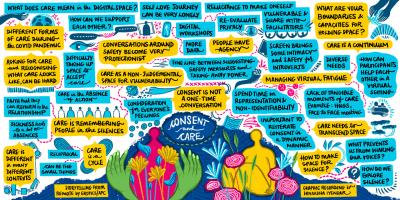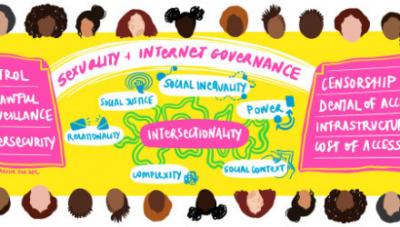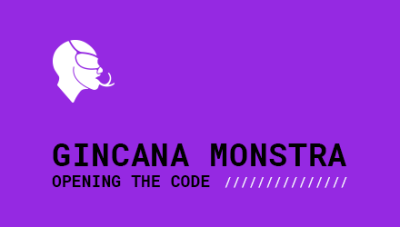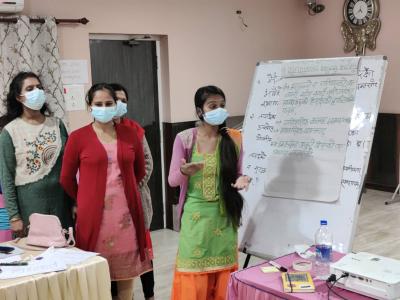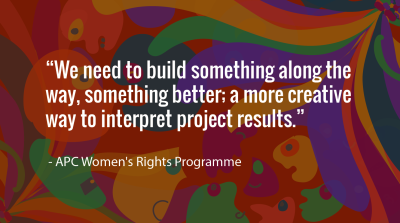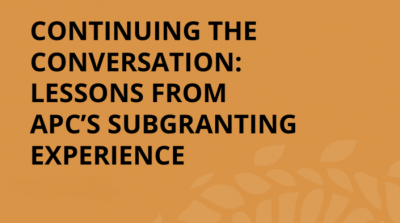
Feminist Tech eXchange (FTX) brings the APC Women's Rights Programme's (WRP's) unique methodology and approach to capacity building. FTX creates safe, creative and feminist spaces of exchange and experience where the politics and practice of technology are informed by local and contextual realities of women, and build collective knowledge and ownership.
FTX was developed in response to the expressed needs of feminist and women’s rights movements for greater understanding of emerging internet and technology-related issues, trends, governance and application in feminist activism. FTX facilitates inter-movement building between women’s rights activists, LGBTIQ+ movements, internet and technology rights organisations, and human rights advocates.
We emphasise local ownership of FTX, and since 2008, when we hosted our first FTX in partnership with the Association for Women's Rights in Development (AWID) and trained over 100 women, we have seen the uptake of FTX by our members and partners in many countries and regions and at subsequent AWID Forums.
Using an approach that prioritises feminist perspectives, women’s rights and movement building, FTX:
- Builds capacity within feminist and women’s rights movements in the creative and strategic use of information and communications technology (ICT).
- Supports the development of a community of trainers who can continue to augment the knowledge and skills of women’s rights, LGBTIQ+ and feminist advocates in different locales, advocacy areas and movements.
- Creates partnerships between feminist, internet rights and women’s rights movements to sustain movement building as a space for open discussions and convergence between internet rights and women’s rights agendas.
- Creates spaces where feminist politics and practices of technology are explored and discussed.
FTX analysis and approach are framed by the Feminist Principles of the Internet (FPIs), a set of principles which work towards empowering more women and queer persons to dismantle patriarchy and realise a feminist internet. FTX’s exchanges are participatory, inclusive, secure, fun, grounded in women’s realities, transparent and open, creative and strategic; they emphasise the role of women in technology and prioritise appropriate and sustainable technologies.
FTX methodologies encourage fun, inclusivity, active listening and participation, and ensure that language diversity is respected and addressed in meaningful ways. We prioritise a collective versus an individualistic approach to technology development that encourages testing, sharing and collectively developing technology. Openness is a core value in our work.
In 2018 we collaborated with our partners to develop the FTX: Safety Reboot, a training curriculum made up of several modules for trainers who work with women’s rights and sexual rights activists to use the internet safely, creatively and strategically. It is a feminist contribution to the global response to digital security capacity building and enables trainers to work with communities to engage technology with pleasure, creativity and curiosity.
In 2019 we hosted the FTX Convening, which brought together feminist practitioners and trainers working on digital safety and self-care to share experiences on using the FTX: Safety Reboot curriculum and to inaugurate a network of trainers for ongoing support, advice and active solidarity.
One of the outcomes of the FTX Convening were the FTX small grants, awarded through a consultative and collaborative selection process by the FTX trainers network to four participant organisations and individuals of the network. These are:
- Brazil: Training of feminist activists – emergency response.
- Kenya: Demystifying the FTX modules. Developing podcasts from conversations with feminist digital security trainers by Cecilia Maundu.
- Mexico: Ecosistemas digitales libres - creating spaces and opportunities where woman and gender non-conforming bodies can go to exchange experiences around technology and holistic security (contribution to an existing project) by Kéfir.
- Mexico: Building a learning community with women freelance journalists in Puebla and Tlaxcala on digital security practices and tactics against online gender-based violence using the FTX curriculum (contribution to an existing project) by Luchadoras.
Visit the Feminist Tech Exchange Platform. Collaboratively created resources for feminists engaging with technology.
Photo: Feminist Internet eXchange Hub at AWID Forum 2016.
